A Western Bay of Plenty group pursuing action on child poverty says some unemployed people and beneficiaries are facing an “increasingly dire” situation.
It follows the release of a report last month that found 18,000 more children were pushed into poverty in the Covid-19 pandemic.
The Child Poverty Action Group (CPAG) report said Government neglect was partially to blame for the increase in child poverty in the first year since the outbreak.
Prime Minister Jacinda Ardern said 43,000 children had been lifted out of poverty by the Government’s official measure, but there was more work to be done.
In the Bay of Plenty, social agencies have flagged food and housing as major pressure points for families in poverty.
The report found poverty, inequity, homelessness and food insecurity were among the burdens which increased for children.
The figures did not take rising housing costs into account.
The report found Māori, Pasifika and disabled children were disproportionately affected by poverty.
Western Bay of Plenty Child Poverty Action Group spokesman David Riley said for people out of work and beneficiaries, the situation was becoming “increasingly dire” as increases to benefit payments were swallowed up by housing costs.
The region had a high number of low-income households and more casual and part-time employment because of Covid. The lack of fulltime employment played into worsening poverty, as did a lack of focus on poverty by the Government before the pandemic.
The region also had the second-highest electricity charges in the country, rent increases, a shortage of rental and emergency housing, and expensive internet connections to grapple with, while inflation helped push up food and petrol costs, he said.
Had children in poverty been considered more in Government policy design “there may have been better protection in place”, he said.
Te Tuinga Whanau Social Services executive director Tommy Wilson said trying to house families was out of reach, and the community needed to focus on helping with practical support.
The memory of a mum who could not afford new school shoes for her daughter was burned into Wilson’s mind.
“A mother was trying to put a pair of shoes that were too small on her daughter to go to school, and her daughter is saying ‘no mummy, it hurts'”.
Other children were running to school barefoot, he said.
Wilson said the number of homeless families would continue to rise, with long-term housing a pipe dream.
“Housing is just off our radar … no we haven’t got houses, but we’re all capable of sharing food.”
Wilson was beginning to see more people help clothe and feed others less fortunate in the community.
In the report, Visions of a Helping chief executive Hand Tiny Deane said they saw the numbers in need increase since Covid-19, because of tourism-related job loss and rising rents leading to evictions.
“We see the families that have suffered through Covid but they were suffering before
Covid as well. We are seeing the escalation of poverty.”
Whānau Ora Commissioning Agency chairwoman and Rotorua Lakes councillor Merepeka Raukawa-Tait said child poverty was family poverty as families could only provide what they could afford.
She said there had been a steady increase in poverty over many years.
Factors such as a low-wage economy, lack of businesses investment in lifting workplace skills, booming rentals, poor households without savings, and an inability to afford reasonable affordable health care played against the vulnerable.
“Poverty is now a familiar face in our community and both local and central government must play their part in reducing its harmful effects.
“If we give up, say it’s too hard, we are consigning a generation to the scrap heap.”
Rotorua’s Budget Advisory Services manager Pakanui Tuhura said wages and benefits were not keeping up with the cost of living, particularly housing, and more people were relying on credit.
He said while there was a lot of part-time and seasonal work available, the costs of travelling to and from work, and impacts on family life, meant many beneficiaries saw no gain in taking up that work.
He said until the housing crisis was sorted, they would continue to see the growing number of homeless families.
Covid highlighted many issues that had been around for decades, he said.
Tuhura said the drive to get children out of poverty should start in the home.
“I don’t know the answer … if we can solve the issue of space travel, quantum physics and putting people on the moon I don’t see why we can’t do the same for this.
“It needs to start now because in 10 years’ time they are going to be young adults and we would have missed our chance.”
A Salvation Army spokeswoman said poverty led to social disconnection and feelings of hopelessness, affecting everyone, especially children.
The Ministry of Social Development Bay of Plenty commissioner Mike Bryant said the number of people receiving the benefit dropped by 2400 in the first six months.
“In our experience, most people who receive a benefit want to be self-reliant and have the dignity of work.”
A Government spokesman said there was no indication GST would be removed from food products.
Ardern, who is Minister for Child Poverty Reduction, said the Government knew the economic impact of Covid-19 could affect low-income earners the most.
She said the Government acted to avoid this happening, including increasing benefits by $25 a week last year, and up to $55 a week more in this year’s Budget.
The number of state houses to be built also expanded to 18,000, the food in schools programme extended and the training incentive allowance reintroduced.
She also noted the rent freeze during lockdown and wage subsidies to protect jobs and guarantee income through the lockdown.
By the Government’s official measure, 43,000 children had been lifted out of poverty on the after-housing cost measure.
Source: Read Full Article

/cloudfront-ap-southeast-2.images.arcpublishing.com/nzme/BAJC3PIAW25QE4S55J26UCI2L4.jpg)
/cloudfront-ap-southeast-2.images.arcpublishing.com/nzme/7IAIT37B732P4RUFOYOZIDEK2A.jpg)
/cloudfront-ap-southeast-2.images.arcpublishing.com/nzme/UBETM4TLZAIKXPAGAPUURB5OTA.jpg)